|
|
|
Sort Order |
|
|
|
Items / Page
|
|
|
|
|
|
|
| Srl | Item |
| 1 |
ID:
164556
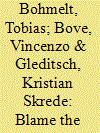

|
|
|
|
|
| Summary/Abstract |
Existing research argues that refugee inflows may increase the risk of domestic conflict, particularly civil war that, by definition, involves the state as an actor. However, many of the postulated mechanisms linking refugees to a higher risk of such conflict pertain to tensions with locals, which do not necessarily involve any grievances against government authorities. We contend that it is more likely to identify an association between refugees and non-state actor violence, that is, armed violence between organized non-state groups, neither of which pertains to the state. We also claim that the extent to which refugees are associated with a higher likelihood of non-state conflict depends on the capacity of governments to manage and mitigate risks. We report evidence that refugee populations can be linked to an increased risk of non-state conflict, as well as for a mitigating effect of state capacity on the risk of non-state conflicts in the presence of refugees. We do not find a clear effect of refugee populations on civil war, suggesting that the link depends on existing conflict cleavages relevant to mobilizing refugees or locals. Our research helps to shed light on the relevant security consequences of managing refugee populations. Despite the common arguments portraying refugees as security risks in developed countries, the risk of non-state conflict applies primarily to weak states that have been forced to shoulder a disproportionate burden in hosting refugees.
|
|
|
|
|
|
|
|
|
|
|
|
|
|
|
|
| 2 |
ID:
154732
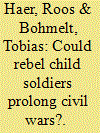

|
|
|
|
|
| Summary/Abstract |
While we know why rebels may recruit children for their cause, our understanding of the consequences of child soldiering by non-state armed groups remains limited. The following research contributes to addressing this by examining how rebels’ child recruitment practice affects the duration of internal armed conflicts. We advance the argument that child soldiering increases the strength of rebel organizations vis-a-vis the government. This, in turn, lowers the capability asymmetry between these non-state actors and the incumbent, allowing the former to sustain dispute. Ultimately, the duration of armed conflicts is likely to be prolonged. We analyse this relationship with quantitative data on child soldier recruitment by rebel groups in the post-1989 period. The results confirm our main hypothesis: disputes are substantially longer when rebels recruit children. This work has important implications for the study of armed conflicts, conflict duration and our understanding of child soldiering.
|
|
|
|
|
|
|
|
|
|
|
|
|
|
|
|
| 3 |
ID:
143279
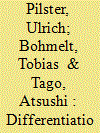

|
|
|
|
|
| Summary/Abstract |
Which factors drive the onset of genocidal violence? While the previous literature identified several important influences, states’ military capabilities for conducting mass-killings and the structure of their security forces have received surprisingly little attention so far. The authors take this shortcoming as a motivation for their research. A theoretical framework is developed, which argues that more differentiated security forces, that is, forces that are composed of a higher number of independent paramilitary and military organizations, are likely to act as a restraint factor in the process leading to state-sponsored mass-killings. Quantitative analyses support the argument for a sample of state-failure years for 1971–2003, and it is also shown that considering a state’s security force structure improves our ability to forecast genocides.
|
|
|
|
|
|
|
|
|
|
|
|
|
|
|
|
| 4 |
ID:
117848
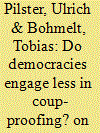

|
|
|
|
|
| Publication |
2012.
|
| Summary/Abstract |
The existing literature on military effectiveness established the robust claim that democracies are more successful and effective in winning interstate wars. One mechanism that explains this relationship heavily draws upon the underlying effect of regime type on civil-military relations. Still, this relationship has not yet been explored systematically, and rigorous empirical research on this issue remains surprisingly scarce. In order to address this shortcoming, this study investigates the patterns of civil-military relations according to different regime types, that is, democracies and nondemocracies. More specifically, the authors examine whether and how democracies invest in coup-proofing, that is, strategies employed to prevent the military from seizing power. The main argument is derived from a principal-agent logic and claims that coup-proofing is both a relatively less attractive and necessary instrument for democratic principals. By analyzing newly compiled time-series cross-sectional data on states' coup-proofing efforts in 1975-1999, the core hypothesis is tested in a quantitative framework.
|
|
|
|
|
|
|
|
|
|
|
|
|
|
|
|
| 5 |
ID:
173886
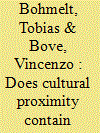

|
|
|
|
|
| Summary/Abstract |
What are the security consequences of population movements? This article seeks to provide a better understanding of when, how, and under what conditions terrorism diffuses across countries via migration flows as a vehicle. We contribute to this debate by studying the influence of migrants’ cultural proximity to the native population of their host country. It is argued that cultural closeness can contain such terrorism diffusion. Similarities in societal norms, customs, or beliefs seem likely to induce trust in the social interactions between migrants and locals. This, in turn, makes it more difficult for terrorist organizations to exploit transnational population movements for radicalization and as a recruitment pool – one of the core mechanisms linking population flows with terrorism. Conversely, migrants from culturally distant societies may find it more challenging to integrate into their new homes. A fertile ground for terrorist organizations for the recruitment of new followers is thereby more likely. Our analyses present consistent evidence that the effect of terrorism diffusing across countries weakens when accounting for cultural closeness between migrants and host societies. This key finding of our research has crucial implications for policy’s and scholars’ understanding of terrorism, the diffusion of terrorism across countries, and the security consequences of population movements.
|
|
|
|
|
|
|
|
|
|
|
|
|
|
|
|
| 6 |
ID:
094695
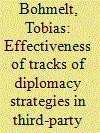

|
|
|
|
|
| Publication |
2010.
|
| Summary/Abstract |
International mediation is not conducted solely by official actors such as states or international organizations. Non-official parties such as individuals and non-governmental organizations increasingly intervene as third-party mediators in conflicts. Both official and unofficial interventions are conceptualized as tracks of diplomacy (ToDs). Even though there is a vast quantitative literature on international mediation, most studies focusing on ToDs have been qualitative and produced few generalizable insights. This article extends the existing literature on third-party intervention by developing a theoretical model to explain the effectiveness of different ToDs, which is then empirically tested in a first large-N study. The findings indicate that the leverage and resources of ToDs determine outcome effectiveness. Track One Diplomacy, that is, efforts by official actors, tends to be the most effective form of intervention as greater leverage and more resources invested can make track intervention more effective. It is also found that combined mediation efforts of both official and unofficial tracks can be more effective than independent track actions. Since conflicts with mediation are unlikely to be a randomly selected set, a selection estimator is used to test the hypotheses on effectiveness. The empirical findings support the theory and demonstrate that the specific type of mediating actor seems highly important.
|
|
|
|
|
|
|
|
|
|
|
|
|
|
|
|
| 7 |
ID:
145696
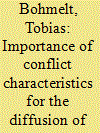

|
|
|
|
|
| Summary/Abstract |
This article argues that similar conflict characteristics form links between crises, which signal the relevant actors – that is, the belligerents and the potential mediator(s) – that a comparable approach in terms of third-party mediation could be suitable across these disputes – even if the relevant parties are not the same. Specifically, demand (antagonists) and supply-side actors (mediators) are likely to employ the heuristic of learning from and emulating the mediation behavior in similar crises. The empirical analysis, using data from the International Crisis Behavior project, shows that comparable patterns in violence, arguably the most visible and salient conflict characteristic, are associated with mediation traveling across crises; other dispute characteristics incorporated into spatial lags are not, however. Hence, particularly as domestic/unit-level (monadic) influences are controlled for, the effect of common exposure is taken into account, and different estimation strategies are used, the results emphasize that there is a genuine diffusion process via common levels of violence in the context of international mediation.
|
|
|
|
|
|
|
|
|
|
|
|
|
|
|
|
| 8 |
ID:
157541
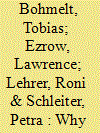

|
|
|
|
|
| Summary/Abstract |
Previous research suggests that political parties learn from and emulate the successful election strategies of governing parties in other countries. But what explains variation in the degree of influence that governing parties have on their foreign counterparts? We argue that clarity of responsibility within government, or the concentration of executive responsibility in the hands of a dominant governing party, allows parties to learn from the most obviously electorally successful incumbents. It therefore enhances the cross-national diffusion of party programs. To test this expectation, we analyze parties’ policy positions in twenty-six established democracies since 1977. Our results indicate that parties disproportionately learn from and emulate dominant, high-clarity foreign incumbents. This finding contributes to a better understanding of the political consequences of government clarity and sheds new light on the heuristics that engender party-policy diffusion by demonstrating that the most visible foreign incumbents, whose platforms have yielded concentrated power in office, influence party politics “at home.”
|
|
|
|
|
|
|
|
|
|
|
|
|
|
|
|
| 9 |
ID:
117595
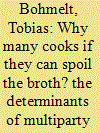

|
|
|
|
|
| Publication |
2012.
|
| Summary/Abstract |
Which factors drive the onset of multiparty mediation? Despite numerous studies explaining the onset of international mediation in conflicts, the literature offers little insight into when we are likely to see 'multiparty mediation', that is, mediation attempts that are conducted by a coalition of interveners. The latter are different from those interventions that only see one mediator, however: mediators forming a coalition are likely to be constrained by different domestic factors and may have different incentives than states pursuing unilateral approaches. Thus, ignoring these patterns can have serious consequences for our theoretical expectations and empirical inferences on mediation onset. In order to address this shortcoming, this article introduces concepts from the coalition-formation literature to the existent research on mediation, and examines the onset of multiparty mediation from a twofold perspective. First, there are supply-side determinants, that is, interveners' incentives for multiparty mediation. Second, the author studies demand-side influences, that is, factors pertaining to the belligerents. By analyzing data for 1950-2000, the following research's main contribution stems from the empirical test of the theoretical framework in a quantitative research design. The results point to a disconnect between the factors that promote single-party mediation onset and those that promote multiparty mediations.
|
|
|
|
|
|
|
|
|
|
|
|
|
|
|
|
|
|
|
|
|